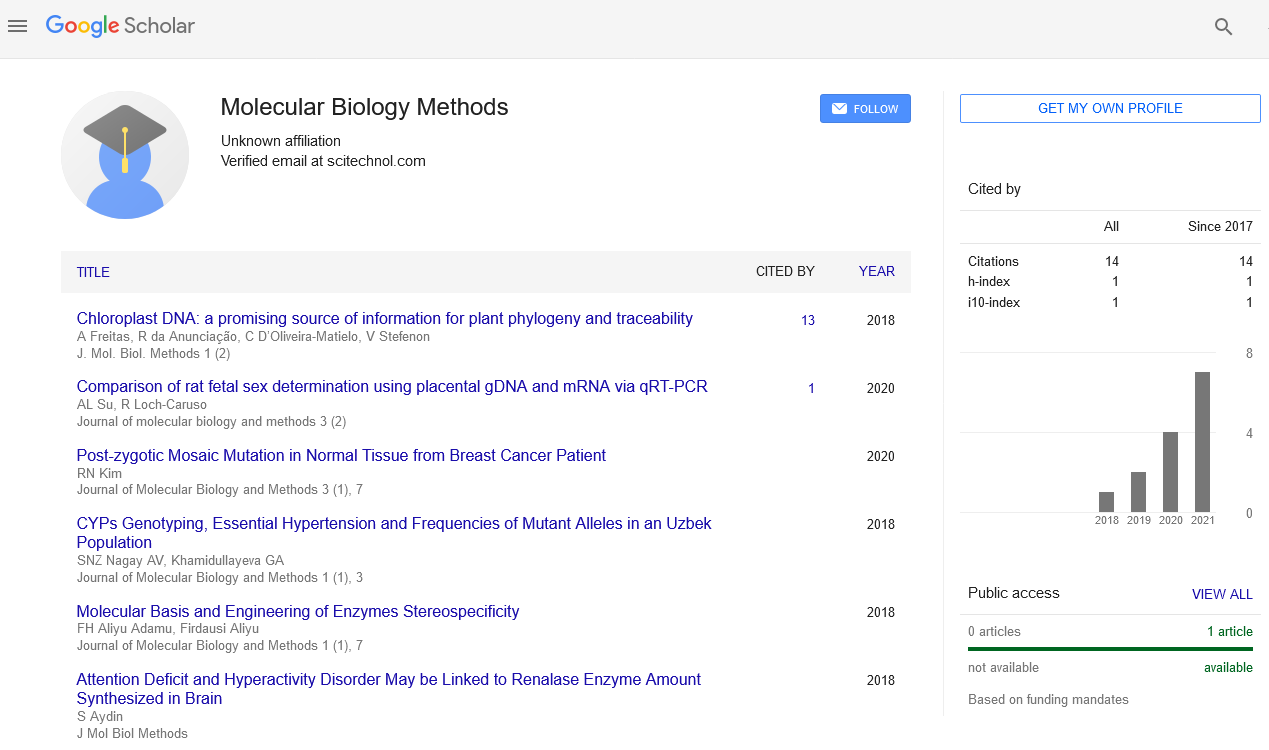Opinion Article, J Mol Biol Methods Vol: 7 Issue: 3
Tumor Biology: Targeted Therapies and Future Directions
Melesse Mengstie*
1Department of Biology, Bahir Dar University, Bahir Dar, Ethiopia
*Corresponding Author: Melesse Mengstie,
Department of Biology, Bahir Dar
University, Bahir Dar, Ethiopia
E-mail: mengstiemelesse@gmail.com
Received date: 26 August, 2024, Manuscript No. JMBM-24-151573;
Editor assigned date: 28 August, 2024, PreQC No. JMBM-24-151573 (PQ);
Reviewed date: 11 September, 2024, QC No. JMBM-24-151573;
Revised date: 18 September, 2024, Manuscript No. JMBM-24-151573 (R);
Published date: 25 September, 2024 DOI: 10.4172/JMBM.1000171
Citation: Mengstie M (2024) Tumor Biology: Targeted Therapies and Future Directions. J Mol Biol Methods 7:3.
Description
Tumor biology is an important field of study that examines the nature, development and progression of tumors, particularly cancers. It encompasses a wide range of processes, from the initial cellular changes that lead to tumorigenesis to the complex interactions within the tumor microenvironment. Understanding tumor biology is important for developing effective therapies and improving patient outcomes. Tumors can be broadly categorized into benign and malignant types. Benign tumors are generally non-invasive and do not spread to other parts of the body, while malignant tumors, or cancers, have the ability to invade surrounding tissues and metastasize to distant sites. The development of tumors typically begins with genetic mutations that alter normal cellular functions, leading to uncontrolled cell proliferation.
The foundation of tumor biology lies in the study of genetic mutations. These mutations can be classified into two main categories: Oncogenes and tumor suppressor genes. Oncogenes are mutated forms of normal genes (proto-oncogenes) that promote cell division and growth. When these genes become overactive due to mutations, they can drive tumorigenesis. On the other hand, tumor suppressor genes are responsible for regulating cell division and promoting apoptosis (programmed cell death). Mutations that inactivate these genes can lead to a loss of control over the cell cycle, contributing to tumor development.
The tumor microenvironment plays a significant role in tumor biology. It comprises various cell types, including cancer-associated fibroblasts, immune cells, endothelial cells and extracellular matrix components. These elements interact dynamically with tumor cells, influencing their behavior and progression. For instance, immune cells can have both tumor-promoting and tumor-suppressing effects. While some immune cells attempt to eliminate tumor cells, others may inadvertently support tumor growth by creating a favorable environment. This duality is why immunotherapy has emerged as a promising treatment approach, aiming to enhance the body’s immune response against tumors.
Tumor cells exhibit altered metabolic pathways compared to normal cells. One of the most notable shifts is the preference for aerobic glycolysis, often referred to as the Warburg effect. Instead of fully oxidizing glucose through oxidative phosphorylation, cancer cells preferentially convert glucose to lactate, even in the presence of oxygen. This metabolic reprogramming supports rapid cell growth and proliferation, providing the necessary building blocks for new cells. Additionally, tumor cells may utilize alternative substrates, such as fatty acids and amino acids, to fuel their growth. Understanding these metabolic changes is crucial for developing targeted therapies that disrupt the energy supply of cancer cells.
The insights gained from tumor biology have prepared for the development of targeted therapies. These treatments are designed to specifically inhibit the molecular pathways that drive cancer progression. For example, tyrosine kinase inhibitors target specific oncogenes that are mutated in certain cancers, offering more personalized treatment options. Tumor biology is a dynamic and rapidly evolving field that encompasses the detailed processes involved in cancer development and progression. By understanding the underlying mechanisms of tumor formation, growth and interaction with the microenvironment, researchers and clinicians can develop more effective strategies for cancer prevention, diagnosis and treatment. As our knowledge continues to expand, so too does the promise of improved outcomes for patients battling cancer.
 Spanish
Spanish  Chinese
Chinese  Russian
Russian  German
German  French
French  Japanese
Japanese  Portuguese
Portuguese  Hindi
Hindi 